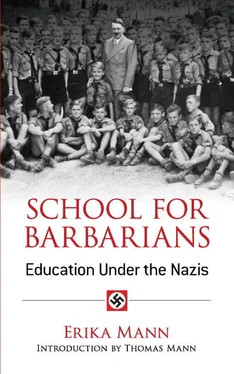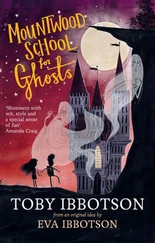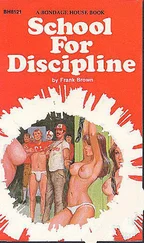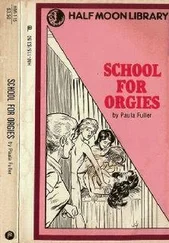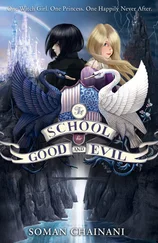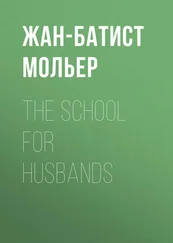The entire existence of the State Youth stands under the sign of battle. A defensive battle; and we must discover, in an honest search, whether there is, somewhere, in some corner, an opponent to meet this challenger.
The life of German youth is filled with hatred. Against whom?
Against the future enemies of the nation — we read that in its songs and plays—against a world of enemies; and, further, against all the weak in Germany, against the conquered. Looking for real enemies, Germany would drag the dead — Rathenau, Eisner, Erzberger — from their graves, again to be murdered, this time more decisively, “legally” at the command of the State!
The institutions which the State Youth does battle against are, as a matter of fact, half-dead, ghostly, with a shadow-life that has just enough reality to constitute a shadow-enemy without which the Nazi, and especially the youth, movement could not exist.
The Jews have a part to play, but there is not much for the State Youth to do there. They are too finished, as a group; there is hardly a twitch of life.
The State Youth knows, as sadistic children know about a caught frog, that you can pull off the frog’s legs, and watch the body try to hop; then stick a pin into the belly, and watch the shocked wrench; and hit its head until it does not move. But pretty soon after that, the frog bores the child, and he turns away to more amusing things. The Jewish enemy is locked out of schools and youth organizations. Forbidden to sleep in inns or swim in lakes, or even play in the playgrounds, he is becoming a little boring.
The Freemason, who was offered to the children as an enemy, was a failure all the way through. They may be as disgusting as “Dr. Freemason” in the play, and of course they’re enemies, but what are they like? “Have you ever seen one?” asks the German child.
The need is for vivid enemies. Above all, it is necessary to keep up the pretense of struggle, an eternal Kampf, with an antagonist who can be identified, recognized face to face, and who can offer the further stimulus of power, or at least the power of resistance. The men controlling the third circle of the German child, from which there is no escape, turn to the other two influences, which, according to them, exist only through their benevolence — the influences which surround the child, and are now to be labeled as enemies — the school and the family.
The school represents an acceptable enemy, a mild, weaponless opponent, without a place to escape to (and by connotation, the church is included here) — an enemy who is still alive and not as dull as the dead.
“Our teacher has a thin, pale nose. The end is flat because at the end of every sentence he strokes it with his right hand. He talks too much. Yesterday he talked about the summer solstice. Like this: ‘On the 21st of June, the sun has reached its apex. Apex means the highest point. Apex means culmination. Culmination is derived from the Latin culminare…. ’ At this moment, Fred who sits beside me, drew his Hitler Boy Quex [a Nazi Youth book] out of his school-bag and started looking for the place he was reading yesterday, while the fellow up in front kept talking about the ‘vocative.’… Fred must have swallowed a fly, for he suddenly began to cough terribly. But it’s just as well, or else I’d have continued thinking for at least another half hour — and it’s never any good to think for more than five minutes on end. Especially not for a boy….”
That is Jungvolk (No. 6, 1934) mocking at school, teachers, the vocative, and all thought, no matter how slight. If this were a private, boy’s magazine, brought out by boys, there would be nothing very objectionable in its tone. But this is official and absolute, edited by the leaders of the State Youth or their subordinates — and its mockery is only a skirmish in Schirach’s war against the school.
In each issue of these periodicals — and they are all official — there are at least two or three contributions with the same derisive aim. One essay is “A Fine Educator!” In the same issue of Jungvolk, the “defensive battle” is, this time, against an obviously well-meaning teacher who submitted a song to the editors.
“There is but one point at which we are sensitive,” the essay irritably begins, “and that is when people mix into our affairs; when they try to palm off their old-fashioned poems on us as though they were timely and up to the minute.”
The little song which is reprinted is hardly to be distinguished from others found in Jungvolk. The entire attitude of resentment can be explained only by this hatred of “people,” and especially teachers, who “mix into” Nazi affairs. The literary level of the publications and of the poetry is hardly one which permits the editors to criticize other authors on literary grounds.
The song is intended as a happy Wanderlied (marching song) and begins in traditional mildness.
Wenn der Kuckkuck lacht in grüner Ferne —
Kuckkuck — Ho-la-h, —
Ach, dann höre ichs lenzfroh gerne—
Kuckkuck, Ho-la-la….
When the cuckoo in the greenwood sings —
Cuckoo — Ho, lala —
I hear the voice of a thousand Springs —
Cuckoo — Ho, lala —
Probably it is the last two stanzas that are referred to as “timely.” They still refer to the cuckoo:
Auch wie Du will ich die Sorgen tragen,
Mahnt die Pflicht, dem Unmut stark entsagen.
Dein “Kuckkuck,” hell und inhaltsschwer,
Beleb mich allemal recht sehr.
Klaren Blickes will ich voll Vertrauen
Aufwärts, vor mich, wie auch um mich schauen,
Als Siegfried steigen mit empor,
Zu öffnen Deutschlands goldnes Tor.
Like you will I the burden bear,
When duty calls, my courage will be there.
Your cry of Cuckoo, beautiful and bright,
Will fortify and set me right.
Clear-eyed and full of trust I see
Ahead, around, and over me —
Like Siegfried, I will rise up straight
To open Germany’s golden gate. [2] Translator’s note: These shockingly bad verses, like the others, are translated on the level of the original.
The verses are feeble, terribly feeble, and not even blood-thirsty. But look at the response! “The author calls himself a scholar,” continues Jungvolk. “He really should know that the National Socialist youth takes its duties damned seriously and has no need to be reminded of the same by a cuckoo. Our only advice to this sort of ‘educator of youth’ is this: ‘Hands off the leadership of youth!’ ”
That’s how to pick a quarrel! And hope the victim will twitch!
But it will not. School is not a good enemy: it is incapable of resistance, nor is there the chance of instigating a countermovement.
And the Church, the priests, teachers of religion, former leaders of religious unions? What about them?
That’s better, now. There’s resistance, and protest, here.
The struggle has been long, full of secret arrests, persecutions, public calumny, opinions repressed, suppression of organizations and instruments of the Church, and the wholesale incitement of youth away from it. The Apex was the trial of Pastor Niemoeller; and the protest of the army chaplains, because they were part of the army, was of special significance.
“The protest handed to the ‘Führer’ by Protestant military chaplains in November, 1937 [wrote one correspondent], which showed them in the light of true ‘Protestants,’ was an expression of rebellious contradiction. It was imposing in its keen directness and showed more vivid signs of life than the Nazis ever expected from this ‘enemy.’ The chaplains objected to the naming of three enemies of National Socialism and consequently of Germany in Nazi camps. The three main enemies were designated repeatedly as Judaism, Freemasonry and Christianity. Since 1934, some thirteen hundred of the entire eighteen thousand pastors of the Reich had been brought into prison or into concentration camps. One high functionary of the Party, on the occasion of a recent Party meeting in Halle, referred to Jesus Christ as ‘this swine.’ School teachers had repeatedly called Jesus a ‘Jewish tramp’ in the classroom. Young teachers had asked their pastors for help because they had not been permitted to speak of Jesus in the sense of the Holy Scriptures, even when they were supposed to be instructing in religion. The military priests went so far as to express doubt as to the Nazi holy of holies — namely, success in the coming war — in case, of course, that they persisted in their anti-Christian campaign. It was impossible for true Christians to be in that accord, necessary to success, for anyone systematically drilled into referring to Christ as a swine and a tramp. And the whole war propaganda would surely fall on deaf ears, since an essential part of the German people would not believe a word of what was said to them, after this battle with the Church.”
Читать дальше
